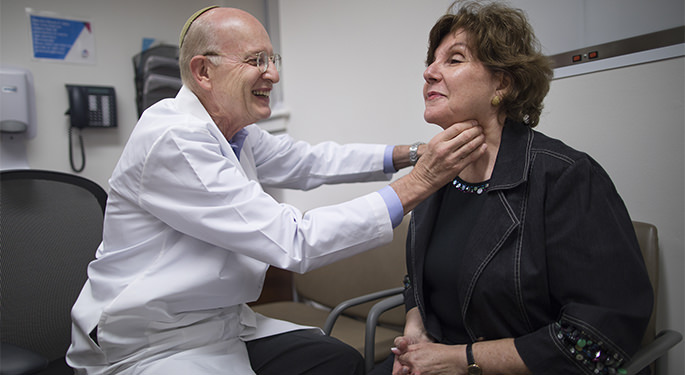Thyroid and Parathyroid Disease

The endocrinologists of the Mount Sinai Health System are experts in the diagnosis and treatment of disorders of the thyroid and parathyroid glands.
The thyroid gland is located at the front of the base of the neck and secretes thyroid hormone, which regulates metabolism. An underactive thyroid (hypothyroidism) can cause fatigue and weight gain. An overactive thyroid (hyperthyroidism) causes rapid heart rate, weight loss and shaky hands. Both conditions are diagnosed by blood tests. Hypothyroidism is treated with thyroid hormone medication, and hyperthyroidism may be treated with medication, radioactive iodine, and sometimes thyroid surgery.
In addition, growths in the thyroid (thyroid nodules) are common. Thyroid nodules may be noticed by patients or by examining physicians, or on imaging tests done for other reasons. Most nodules are benign and can be safely observed, but a few are thyroid cancers, which are treated with surgery. Diagnostic evaluation of nodules includes ultrasonography and fine needle aspiration (thyroid biopsy), a simple office procedure to obtain thyroid cells for microscopic examination and other tests.
The parathyroid glands are four small glands adjacent to the thyroid, but which secrete a very different hormone (parathyroid hormone). Parathyroid hormone regulates bone metabolism as well as calcium levels in the blood. Overactive parathyroid glands are common, and are typically diagnosed by high calcium levels in the blood together with high levels of parathyroid hormone (hyperparathyroidism). In many cases there are no symptoms, but this disorder can cause bone loss with osteoporosis and kidney stones. Treatment (if required) is surgical removal of one or sometimes more than one enlarged parathyroid glands.
For both thyroid and parathyroid disease, our endocrinologists work closely with highly expert surgeons when surgical treatment is needed.